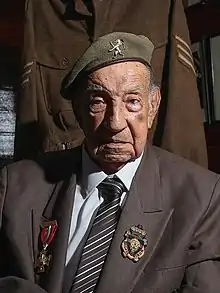Jorge Sanjinez Lenz
Jorge Sanjinez Lenz (January 24, 1917 – August 24, 2020) was a Peruvian military veteran of Belgian descent who participated as a military volunteer in World War II, on the side of the Allies for the liberation of Europe from the Axis Powers.[1] He enlisted in the Piron Brigade in the Free Belgian forces.[2][3]
Jorge Sanjinez Lenz | |
|---|---|
 Sanjinez in 2019. Official photo of the Ministry of Defense of Peru. | |
| Born | January 24, 1917 Moquegua, Moquegua, Peru |
| Died | August 24, 2020 (aged 103) Pucallpa, Ucayali, Peru |
| Buried | Pucallpa, Peru |
| Allegiance | Belgium |
| Rank | Sergeant |
| Unit | Independent Belgian Brigade |
| Battles/wars | Second World War |
| Awards | Legion of Honour |
Early years
He was born on January 24, 1917, in Moquegua, Peru.[4] His childhood passed through periods in his country and in Bolivia.[4]
Second World War
In December 1942, in the midst of the Second World War.[1] Sanjinez attended the Belgian embassy in Lima to enroll in the rebel camp that the government of the European country was promoting, along with other governments in exile, to end the Nazi occupation.[4] The Peruvian Armed Forces recognized the decision and provided special training to Sanjinez, the government of Peru was part of the allies.[5]
He left on a Chilean ship bound for New York and from there to London.[4] During his stay in the British capital, he got lost with a friend in Hyde Park, London where they survived The Blitz.[4]
His first participation was in August 1944, in the Battle of Normandy, then in the Dutch campaigns. Sanjinez said that during his stay on the Western Front he knew death directly:
We saw the explosion and little by little we got closer to the place. We could only find the trunk of the sergeant. He had lost his hands and legs and was dead. The driver was lying several meters away, unconscious. We were seconds away from being in the jeep, but we were saved.[4]
The other campaigns of Sanjinez were the advances for the German unemployment in 1944 of France (Cabourg, August 21, Deauville, August 22 and Honfleur, August 24) and Belgium (Brussels, September 3).[6]
Post-war

In 1946 he returned to Peru after finishing his volunteering in 1945, he married his third wife Meldín Alava, a native of Pucallpa and had two children.[4] He also had three other children from his previous relationships.[4] He also worked for the airline company Faucett, from the 1940s and 1950s.[4]
Death
Sanjinez died on 24 August 2020[6] at his home in Pucallpa at 103 years of age due to lung cancer,[6] an ailment that had afflicted him for some time.[7] He was the last Latin American soldier to die who participated in D Day.[8]
Awards
He received several recognitions and medals for his participation. The most important is the medal of the Legion of Honor in knighthood by France, awarded in 2017 by the French embassy.[9]
References
- ""A la guerra se va a matar y a que lo maten a uno": la historia del último peruano que participó en la Batalla de Normandía, durante la Segunda Guerra Mundial". prensalibre.com (in Spanish). 7 June 2017. Retrieved 28 August 2020.
- "Peruano que luchó en la Segunda Guerra Mundial es condecorado por las Fuerzas Armadas" (in Spanish). La República. 13 September 2019. Retrieved 28 August 2020.
- "La brigada Pirón" (in Spanish). El Comercio. 14 September 2019. Retrieved 29 August 2020.
- "El peruano que desembarcó en Normandía". accesoperu.com (in Spanish). 26 February 2017. Retrieved 28 August 2020.
- ""Aprendí a ser soldado, pero no me gustan las guerras"" (in Spanish). El Peruano. 14 September 2018. Retrieved 28 August 2020.
- "Murió Jorge Sanjinez, el héroe peruano de la Segunda Guerra Mundial" (in Spanish). Andina. 25 August 2020. Retrieved 28 August 2020.
- "Falleció el ultimo peruano en la Segunda Guerra Mundial, Jorge Sanjinez" (in Spanish). Caretas. 24 August 2020. Archived from the original on 7 September 2020. Retrieved 28 August 2020.
- "'La guerra no es para jugar', dice el último superviviente latinoamericano del Desembarco" (in Spanish). Radio France Internationale. 8 August 2019. Retrieved 28 August 2020.
- "Militar peruano que luchó en la II Guerra Mundial fue condecorado por Francia" (in Spanish). Diario Correo. 27 February 2017. Retrieved 28 August 2020.